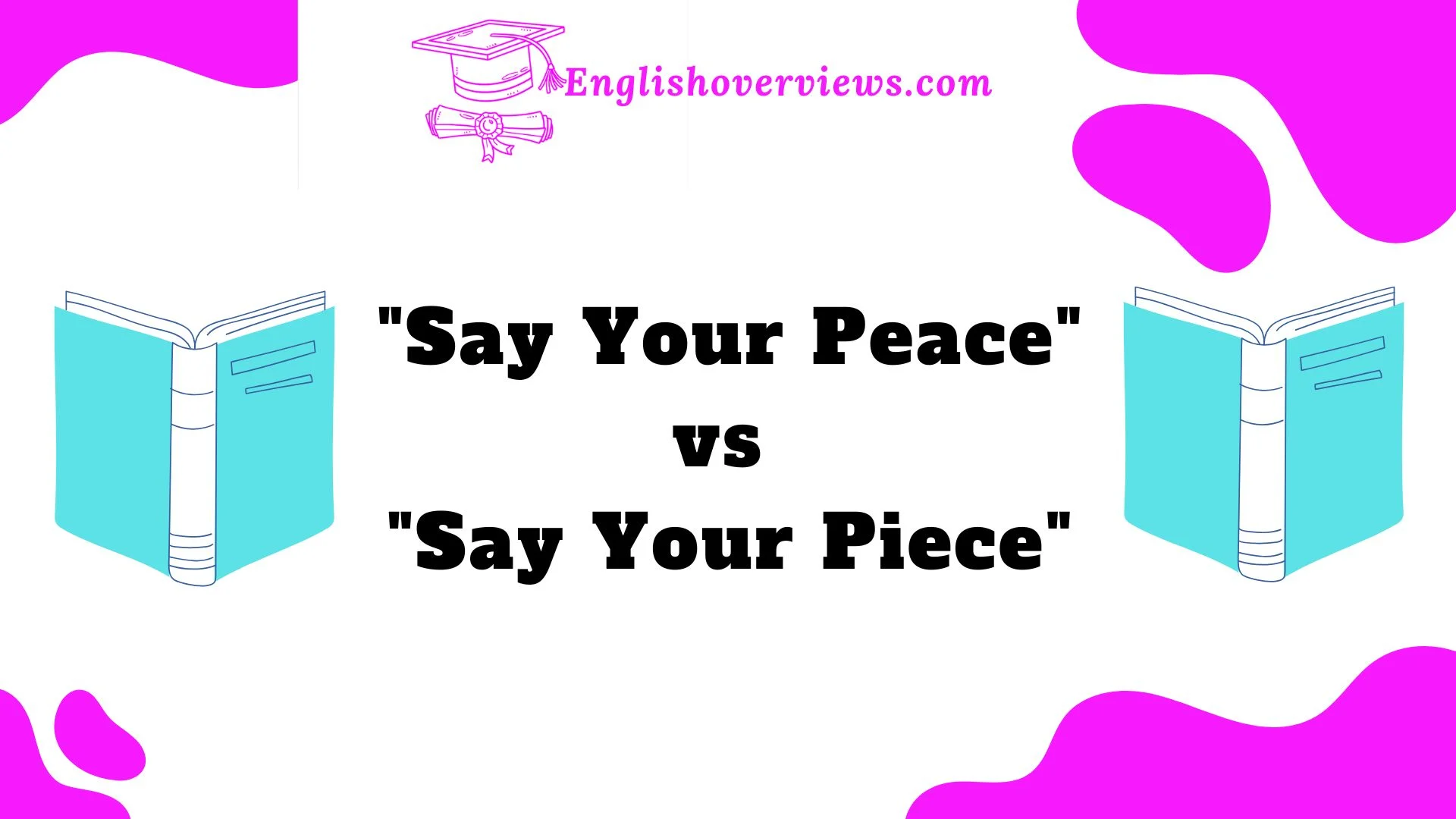How many times have you heard someone confidently say, “I’m going to say my peace,” only for it to sound a little… off? You might’ve wondered, Isn’t it supposed to be “say your piece”? Well, you’re not alone! The mix-up between “say your peace” vs “say your piece” is surprisingly common, but there’s a crucial difference between these two expressions.
In this article, we’re diving into the meaning and usage of these phrases to clear up the confusion. We’ll explore the correct expression, look at why people misuse it, and also uncover some fascinating linguistic insights.
By the end, you’ll be equipped with the knowledge to confidently use the phrase “say your piece” and understand how context plays a vital role in choosing the right words.
So, let’s tune in, and let’s uncover the truth behind this often-misunderstood idiomatic expression!
The Correct Expression: “Say Your Piece”
What Does “Say Your Piece” Mean?
The idiom “say your piece” means to express your opinion or share your thoughts. It’s often used when someone feels strongly about something and needs to speak up, whether it’s during a heated discussion or just in a casual conversation.
Example in context:
- “I’m going to say my piece about the new company policy—this isn’t sitting well with me.”
In this sentence, the speaker is preparing to express their opinion on something that’s bothering them.
This expression has been around for centuries and is still widely used in both everyday speech and more formal settings. The phrase gives the sense that you’re sharing a single thought or a well-formed opinion—hence, “piece” of your mind.
The Incorrect Variant: When “Say Your Peace” Sneaks In
Why “Say Your Peace” is a Mistake
You’ve probably heard the phrase “say your peace” used incorrectly in place of “say your piece.” While this might sound logical to some, it’s actually a misuse of the idiom. The confusion likely stems from the similarity in pronunciation and the fact that peace is a word that feels fitting in a context of expression—who doesn’t want peace, right?
However, “peace” doesn’t fit the meaning of the phrase. Peace refers to harmony or absence of conflict, not an individual’s opinion. When you say “say your peace,” it could suggest you’re seeking harmony or attempting to avoid conflict, which doesn’t align with the intention of expressing personal thoughts or opinions.
Example of misuse:
- “Before we finish, I just want to say my peace about the situation.”
This phrasing implies that the speaker wants to bring calm or peace, not necessarily voice an opinion or express personal thoughts.
The Role of Homophones in Idiomatic Mix-Ups
Understanding Homophones: What Are They?
The confusion between “peace” and “piece” can be explained through the concept of homophones—words that sound the same but have different meanings and spellings. In English, homophones can trip up even the most seasoned speakers and writers, especially when the words are used in idiomatic expressions.
Let’s take a look at some other common homophones in English:
| Homophone 1 | Homophone 2 | Example 1 | Example 2 |
| To | Too | I’m going to the store. | I want too much. |
| Their | There | Their dog is cute. | We’re going over there. |
| Complement | Compliment | This wine is a great complement to the cheese. | She gave me a nice compliment. |
| Peace | Piece | The world needs more peace. | I want a piece of cake. |
While “say your piece” and “say your peace” sound very similar, their meanings differ dramatically. This is a perfect example of how homophones lead to errors, especially in phrases where the intended meaning relies heavily on the context.
Historical Usage and Popularity in Literature
Where Did “Say Your Piece” Come From?
The idiom “say your piece” has been around since at least the 16th century. It originally came from the idea of someone delivering a speech or a formal statement. Over time, the phrase became more informal, but it always kept the sense of expressing one’s thoughts or speaking up.
It’s also worth noting that literature and poetry have long used this expression. For instance, in Shakespeare’s works, characters often “say their piece” when addressing matters of great importance.
One of the earliest recorded uses of this idiom comes from John Heywood, a 16th-century English playwright, who used the phrase to mean a person would speak their mind clearly and without hesitation.
How Context Can Clarify the Intended Meaning
Analyzing Context to Choose the Right Phrase
While “say your piece” and “say your peace” sound similar, context is the ultimate key to understanding which expression is appropriate.
Here’s how context plays a role:
- In a heated discussion or debate: When people are discussing opposing views, they might say, “Let me say my piece.” This implies sharing an opinion, not trying to find peace.
- In a calm, reflective conversation: If the conversation is about resolving an issue, someone might mistakenly say “say your peace” thinking they’re promoting harmony, but it wouldn’t make sense in the context of expressing a strong opinion.
Case Study: Political Debates
In political debates, speakers often express opposing views or strong opinions. In these situations, the phrase “say your piece” is the correct expression, as it reflects a well-formed opinion being shared with others.
For example:
- “I’m going to say my piece about the economic policy. It’s time for change.”
In this case, “say my piece” emphasizes the speaker’s intent to express a firm stance.
Maintenance of ‘Piece’ in the Modern Lexicon
Why “Piece” Endures in Popular Speech
Despite the confusion, the expression “say your piece” has remained relatively stable in the modern lexicon. This is partly due to its clear meaning and relevance in expressing personal opinions or important thoughts.
In contrast, “say your peace” never gained traction because it doesn’t align with the way we use language to convey individual expression. Over time, as language evolves, phrases like “say your piece” stay in use because they fulfill a specific communicative function.
Tips for Maintaining Correct Usage:
- Educate Others: Share your knowledge with friends and colleagues to help stop the spread of “say your peace.”
- Practice Correct Usage: The more you use “say your piece” correctly, the more natural it becomes in your conversations.
Conclusion: Embracing Correct Idiomatic Expression
Understanding the difference between “say your piece” and “say your peace” isn’t just about being grammatically correct—it’s about enhancing communication. The right idiomatic expressions can make your message clearer, more impactful, and more in tune with the intended meaning.
To recap:
- “Say your piece” is the correct form and means to express an opinion or make a statement.
- “Say your peace” is a common but incorrect variant, confusing the idea of speaking up with seeking peace.
- Context is everything! Always pay attention to the situation to choose the right phrase.
By using the right phrase, you’ll not only sound more polished, but you’ll also ensure that your message lands exactly as intended. So, next time you feel the need to speak up, remember: say your piece!
FAQs
What is the difference between “say your peace” and “say your piece”?
- “Say your piece” means to express your opinion, while “say your peace” is a common mistake, as “peace” refers to harmony or calm, not an opinion.
Can I use “say your peace” in formal writing?
- No, “say your peace” is incorrect in formal contexts. Always use “say your piece” to express your opinion.
How can I avoid mixing up homophones in idiomatic phrases?
- Pay attention to context! The meaning will often clarify whether you’re discussing an opinion (“say your piece”) or peace (“say your peace”).
Why is “say your piece” more popular than “say your peace”?
- “Say your piece” has clear historical roots, making it the correct phrase. “Say your peace” is a misheard version that doesn’t make sense in context.

English Overviews is a resourceful website dedicated to providing valuable content related to grammar and vocabulary. AD has made notable contributions, sharing insights on various subjects, including WordPress themes and plugins. The primary goal of the site is to help users improve their English language skills effectively.











